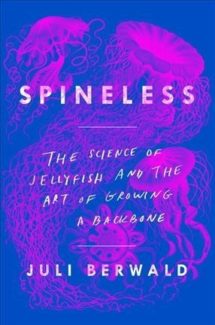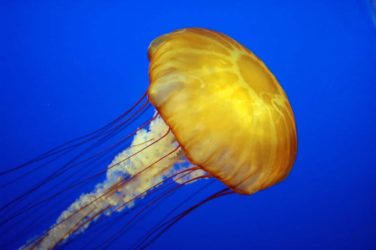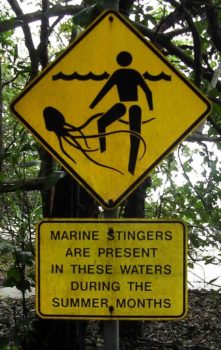The science of stings and slime…
Author: Juli Berwald
 Charisma. Some animals have it in abundance, from honey bees to polar bears to dolphins. If you want to write a science book that thrills, a charismatic topic is always a wise choice. That’s why you don’t come across a lot of books about jellyfish. From their sliminess and nasty stings to the fact that they don’t even have a face (or a brain), it’s hard to love a jellyfish. It was this rather unfair reality that motivated science writer Juli Berwald to write about her favorite animal, the lowly jellyfish. The result is Spineless; and while it might not make you love them, it’s sure to engender a new found respect for these remarkable creatures.
Charisma. Some animals have it in abundance, from honey bees to polar bears to dolphins. If you want to write a science book that thrills, a charismatic topic is always a wise choice. That’s why you don’t come across a lot of books about jellyfish. From their sliminess and nasty stings to the fact that they don’t even have a face (or a brain), it’s hard to love a jellyfish. It was this rather unfair reality that motivated science writer Juli Berwald to write about her favorite animal, the lowly jellyfish. The result is Spineless; and while it might not make you love them, it’s sure to engender a new found respect for these remarkable creatures.
But before we dive into the bizarre world of planulae, polyps, ephyrae and medusae, one has to wonder how an otherwise normal science textbook editor and mother of two in the distinctly jellyfish-free metropolis of Austin, Texas becomes a globetrotting jellyfish fanatic. Well it’s a truly interesting story and Berwald tells it well, all the while revealing the many fascinating secrets that jellyfish scientists have uncovered over the last few decades.
If the jellyfish won’t come to Austin, you have to go where they are. So scrapping together her spare change and frequent flier miles, the author heads off the some of the planet’s jellyfish hotspots, hoping to catch one of the often elusive jellyfish blooms. From a remote Japanese island, to Spain’s Mediterranean coast to the tiny southern tip of Israel that just manages to touch the Gulf of Aqaba on the Red Sea, Berwald’s jellyfish hunting adventures make for fun and informative reading.
When she’s not describing the results of the last 500 million years of jellyfish evolution – featuring most prominently countless variations on the explosive and potentially lethal cnidocyte – she’s trying to make sense of the often inexplicable booms and busts of jellyfish populations worldwide. Whether anthropogenic climate change is likely to help or hurt jellyfish numbers over the coming decades is a question that’s still up in the air and Berwald goes a long way in explaining why it’s such a complicated question.
Anyone who writes about marine life can’t avoid but run smack dab into the fact that humans are rapidly destroying the oceans. It’s an ecological truism that all plants and animals impact their environment in some way, but for an indisputable land animal like humans to decimate the three water-covered quarters of the planet in which we really have very little business suggests a level of malevolence that exceeds the imagination. As Berwald’s story progress, her determination to try and do something about this crisis evolves into a real passion.
Feared for their deadly venom and renowned for their unique beauty, there are few animals stranger than the jellyfish. Supported by a motley assortment of avid researchers, Spineless is an endlessly enthusiastic deep dive into the bizarre world of these fascinating, yet neglected, creatures. This landlubber found it consistently entertaining and it’s sure to please anyone who enjoys good science writing.
Sea nettle photo by Dan90266 (CC BY-SA 2.0)/sign photo by TydeNet (CC BY-SA 3.0)
Check out some of Dave’s review of books about other spineless creatures: The Sound of a Wild Snail Eating / Spineless (by photographer Susan Middleton) / Kraken / The Soul of an Octopus
[AMAZONPRODUCTS asin=”0735211264″]
- Best Non-Fiction of 2016 - February 1, 2017
- Little Free Library Series — Savannah - May 22, 2015
- Little Free Library Series — Wyoming - November 30, 2014




